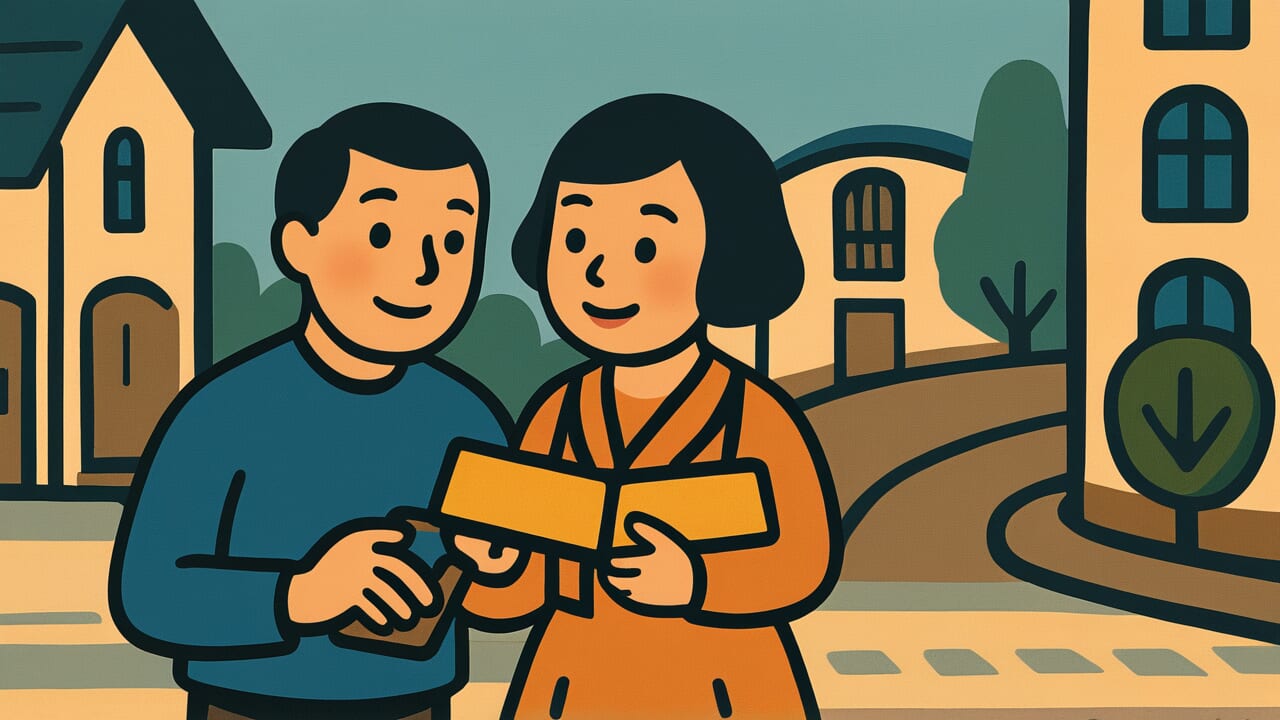How to Read “Pass on your parents’ kindness through your children”
Oya no on wa ko de okuru
Meaning of “Pass on your parents’ kindness through your children”
This proverb teaches that you should repay your parents’ kindness not by trying to pay them back directly, but by pouring love into your own children.
The time, effort, and love our parents gave us is immeasurable. But when we try to repay them, they may already be elderly, or they might pass away before we can fully return their kindness.
This proverb is used when someone struggles with not being able to repay their parents. It shows there’s another way to return that debt.
By giving the love you received to the next generation, kindness circulates across generations. Today, this saying offers a new perspective to people who worry about parenting or feel guilty about their parents.
It presents the idea of a chain of love that continues forward.
Origin and Etymology
No clear written records exist about the origin of this proverb. However, it likely emerged from traditional Japanese views on family and the philosophy of “passing kindness forward.”
The phrase “repaying kindness” is widely known. But this proverb presents a unique concept: “sending kindness forward.”
The idea of giving to your children rather than repaying your parents directly is wisdom nurtured within Japan’s family system.
During the Edo period, filial piety was considered a virtue among common people. Yet many likely passed away without fully repaying their parents.
In this context, the idea spread that you could create a chain of kindness across generations by pouring the love you received into your own children.
This saying reflects influences from Buddhist karma and Confucian teachings about filial piety. But it’s not just about honoring parents.
It contains a more practical and warm life philosophy about circulating kindness vertically through generations. This way of connecting love from generation to generation expresses the essence of Japanese family values.
Usage Examples
- They say pass on your parents’ kindness through your children, so I’ll give my kids all the love I can
- I lost my father before I could be a good son, but the saying pass on your parents’ kindness through your children gave me comfort
Universal Wisdom
The proverb “Pass on your parents’ kindness through your children” contains deep insight about the sustainability of human society.
If we only tried to repay our parents, the flow of kindness would stop there. But by sending it to the next generation, love circulates forever.
This wisdom shows that human bonds aren’t straight-line transactions. They’re chains that continue in a spiral pattern.
Parents don’t expect returns from their children, and children don’t expect returns from their own children. This chain of unconditional love is the fundamental mechanism that has supported humanity for thousands of years.
This proverb also has the gentleness to free people from guilt toward their parents. No one can repay their parents perfectly.
Countless people regret things after their parents die. But with the perspective of sending kindness forward, we can face the future.
We can reframe love not as a debt to the past, but as a gift to the future.
This way of thinking also contains wisdom to ease generational conflict. When young people view raising children not as an obligation to support the elderly, but as a voluntary act of sending forward the kindness they received, a warm circulation emerges throughout society.
When AI Hears This
The structure of sending kindness to children rather than returning it to parents has remarkable efficiency from a network theory perspective.
In a “reverse flow model” where kindness returns to parents, it just moves back and forth between parent and child. The network becomes a closed circuit between two nodes.
But in the “downstream model” of sending to children, kindness flows continuously along the time axis. Theoretically, it spreads infinitely.
What’s important here is the “asymmetry” where the parent generation doesn’t need kindness returned. Parents already received kindness from their grandparents, so they don’t need to wait for repayment from children.
In other words, each generation is in “reception complete” status when transmitting to the next generation. No delays occur across the entire network.
This resembles “one-way communication without acknowledgment” in communication networks.
Even more interesting is the amplification effect. If parents send kindness to two children, and those children each send to two more, it spreads to eight people in three generations.
This is exponential growth. After ten generations, it reaches 1,024 people. If kindness returned to parents, the total amount wouldn’t increase no matter how many generations passed.
This one-way nature is exactly how humanity has accumulated knowledge and culture. Each generation improves what they received from the previous generation and passes it forward.
This increases the total value of society over time. The design of “sending” rather than “returning” kindness was actually the most efficient social system.
Lessons for Today
This proverb teaches modern people that love has no repayment deadline or interest. Even if you couldn’t perfectly return the love you received from your parents, that’s not a failure.
By giving that love to the next generation or to young people around you, you’re fulfilling your role completely.
In modern society, nuclear families and declining birth rates may make this “sending forward” harder to practice. But this teaching shouldn’t be limited to blood relations.
Mentoring junior colleagues at work, watching over children in your community, sharing knowledge and experience with younger generations—all of these are acts of “sending kindness forward.”
What matters is not carrying the kindness you received as a burden, but transforming it into positive energy.
The love you give to someone will eventually become love that person gives to someone else. It becomes an invisible web of bonds supporting society.
Rather than aiming for perfect repayment, support the next generation within your means. Why not join the chain of love with that relaxed attitude?



Comments